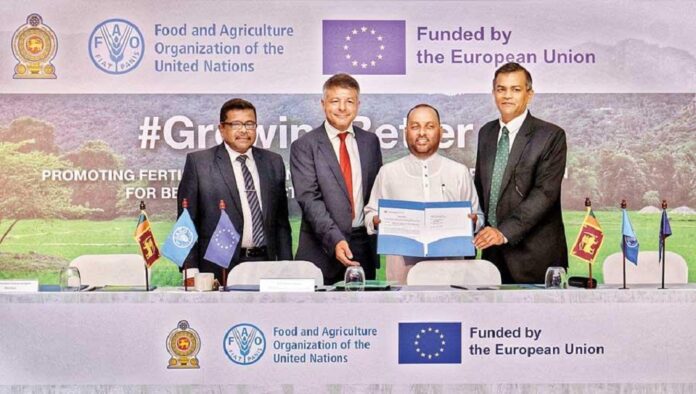The Food and Agriculture Organization (FAO) partnered with the European Union (EU) to support government policies to achieve food security, ensure higher and sustainable incomes for farmers, improve agriculture production and productivity, and sustainably manage the environment.
More than 81 per cent of Sri Lanka’s population lives in rural areas; four fifths of the country’s poor people are dependent on the rural sector; and almost half of poor rural people consist of small-scale farmers.
Agriculture employs 28 per cent of the labour force, and small-scale farmers produce most of the country’s agricultural output.
European Union and FAO have stepped into to provide fertilizers, seeds and training to the most vulnerable paddy farmers in Sri Lanka
The European Union (EU) has allocated 4 million Euro (approximately Rs1,5 billion ) in grants for fertilizers, seeds, and training to the most vulnerable farmers, as a response to the agriculture and food security crisis in Sri Lanka.
These funds will be implemented by the Food and Agriculture Organization (FAO) in Sri Lanka. The action has been officially launched yesterday (07) in Colombo.
The recent economic crisis severely impacted all farmers in the country, especially smallholder farmers cultivating lands of up to 0,5 ha.
These farmers have suffered immensely due to a major crop failure over the previous two harvesting seasons due to a lack of fertilizers and other inputs. This has led to reduced income and impacted their ability to provide for their essential needs, including food.
European Union Ambassador,. Denis Chaibi said: “He is very pleased to announce this new action today. We teamed up with FAO to help bring Sri Lankan agriculture back on track to prevent food shortages and to increase farmer’s incomes.
Together we will provide highly essential inputs such as fertilizers and seeds. We will also train farmers and extension officers on how to shift to less resource intensive paddy cultivation practices.
He expressed the hope this new support will contribute towards an organized transition to a more sustainable, resilient, and productive agriculture sector in Sri Lanka.”
FAO Representative in Sri Lanka, Vimlendra Sharan said , “As FAO we will work closely with the Ministry of Agriculture and Ministry of Irrigation to ensure the success of this project which will make a strong case for adopting sustainable practice across the country.”
The project will support 41,000 smallholder farmers cultivating land holdings of up to 0.5 Ha in the districts of Polonnaruwa, Badulla, Ampara, and Hambantota.
They will each receive a 50 kg bag of urea for the 2023 Yala cropping season. In addition to that, targeted capacity building will be provided to those farmers as well as extension workers on how to use fertilizer efficiently, reduce actual needs for chemical fertilizer, enhance the use of organic fertilizer and improve long-term soil fertility.
To strengthen the seed paddy production system in Sri Lanka to meet current demand, the project will also support farmers to grow quality paddy seeds and strengthen government owned farms in growing and processing certified paddy seeds.
